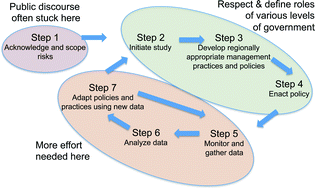Evolving shale gas management: water resource risks, impacts, and lessons learned†
Abstract
Unconventional shale gas development promises to significantly alter energy portfolios and economies around the world. It also poses a variety of environmental risks, particularly with respect to the management of water resources. We review current scientific understanding of risks associated with the following: water withdrawals for hydraulic fracturing; wastewater treatment, discharge and disposal; methane and fluid migration in the subsurface; and spills and erosion at the surface. Some of these risks are relatively unique to shale gas development, while others are variations of risks that we already face from a variety of industries and activities. All of these risks depend largely on the pace and scale of development that occurs within a particular region. We focus on the United States, where the shale gas boom has been on-going for several years, paying particular attention to the Marcellus Shale, where a majority of peer-reviewed study has taken place. Governments, regulatory agencies, industry, and other stakeholders are challenged with responding to these risks, and we discuss policies and practices that have been adopted or considered by these various groups. Adaptive Management, a structured framework for addressing complex environmental issues, is discussed as a way to reduce polarization of important discussions on risk, and to more formally engage science in policy-making, along with other economic, social and value considerations. Data suggests that some risks can be substantially reduced through policy and best practice, but also that significant uncertainty persists regarding other risks. We suggest that monitoring and data collection related to water resource risks be established as part of planning for shale gas development before activity begins, and that resources are allocated to provide for appropriate oversight at various levels of governance.


 Please wait while we load your content...
Please wait while we load your content...